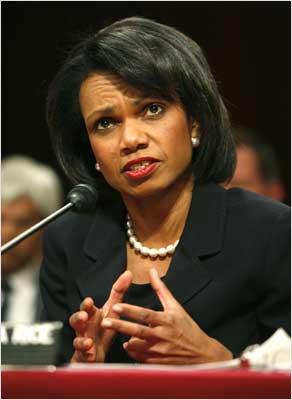 There’s a Middle Eastern country pursuing nuclear weapons, releasing anti-Western statements, and using conservative Islam as a lightning rod for its people; and it’s the one next to the country we chose to invade in 2003. Now, in 2006, we’re being forced to take Iran very, very seriously.
There’s a Middle Eastern country pursuing nuclear weapons, releasing anti-Western statements, and using conservative Islam as a lightning rod for its people; and it’s the one next to the country we chose to invade in 2003. Now, in 2006, we’re being forced to take Iran very, very seriously.Iran elected Mahmoud Ahmadinejad, a conservative with religious views, president on August 3, 2005. His nationalistic rhetoric won the hearts and minds of his people, and I remarked then that his style reminded me of our own President. Tough-talking leaders with bold agendas seem to be all the rage these days. That is one area of American culture that is definitely catching on in other countries.
Since his election Ahmadinehjad has put Iran on everyone’s lips with a decisive vision to get his country nuclear power. The timeline is stunning: by April 2006 he announced that Iran had successfully refined uranium. Western countries, of course, are trying to convince Iran that nuclear power—and the fear of nuclear weapons—is not the right course. But so far Iran has been defiant and what are the West’s options? What if Iran doesn’t care what we think is best?
Secretary of State Condoleezza Rice recently stated, “We believe that diplomacy has a chance to work, but we are going to work with whom ever we can, in whatever form we can, diplomatically, to try to bring the Iranians around.”
She then added, “Iran is not Iraq. I know that’s what’s on people’s minds but the circumstances are different. We don’t have 12 years of Security Council resolutions, a case where a state attacked its neighbor, tried to annex its neighbor as it (Iraq) did with Kuwait where we were still in a war after the armistice of 1991.”
No, Iran is not Iraq. America once had the support of the world behind it after 9/11, and Bush had the will of the American people. The diplomacy game with Iraq consisted of the White House making statements about Saddam Hussein’s lack of compliance with UN Resolutions requiring weapons inspectors to have access to suspected WMD production facilities. President Bush backed up the rhetoric with a military build-up and on November 8, 2002 the UN Security Council passed Resolution 1441, giving Iraq one last chance to meet UN criteria or face the threat of force. Iraq complied but chief inspector Hans Blix wasn’t satisfied. The US invaded in March of 2003.
The Bush administration was making plans for Iraq as early as December 2001, in 2006 it seems to have no idea what to do with Iran other than the same tactics it used on its neighbor.
Psychologist Abraham Maslow once said that if your only tool is a hammer you tend to view every problem as a nail. I think the Bush administration has proven that it has only one tool in its box, and it has accomplished most—for better or worse—by hammering away at problems. But Iran is not that easy, and now we have to try the more passive and patient game of diplomacy. Hopefully Mrs. Rice has been reading up on how to use other tools because our hammer is currently on-loan in Iraq.
The United States is back at the UN demanding action against Iran, namely a resolution that would declare Iran a threat to international peace and security that would pave the way for sanctions and military measures. Sound familiar? The President told the media that “the diplomatic process is just beginning” but all I hear is a hammer.
It’s a sobering thing to think that we’ve spent $350 billion to stop the country that did not have WMDs, while Iran is developing nuclear power right next door. Ooops, huh? Yeah, we were pretty confident when it came to knocking Iraq over—a country barely able to defend itself before our awesome military might. And I think the shock and awe we were so gleeful about has become the imagery of a country determined to reshape the Middle East in its own image. And now Iran is posturing itself as the defender of that region, working hard to acquire the trump card that will force us to deal with it respectfully: nuclear power.
Consider the results of India’s nuclear ambition. India, a country which has not signed the Nuclear Non-Proliferation Treaty, was ushered into the Nuclear club by President Bush in an agreement that would give it access to US civil nuclear technology while its military program will remain hidden. What did India lose by gaining nuclear power? And look what it has gained. Why are we stunned or angry when other countries attempt to do the same?
No comments:
Post a Comment